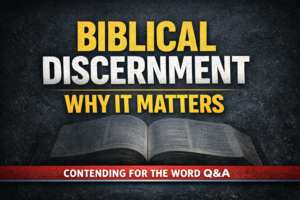⏱️ Estimated Reading Time: 6 min read
 Grace and truth are to be the key markers of all Christian relationships. Often we find that we can be good with one or the other of these characteristics, but to combine both takes great sensitivity and ultimately the guidance of the Holy Spirit. The balance of the two is particularly important when we consider the way the Christian community can and should relate to the LGBT community. Compassion without Compromise offers a simple exploration of the balance of grace and truth in this very relationship.
Grace and truth are to be the key markers of all Christian relationships. Often we find that we can be good with one or the other of these characteristics, but to combine both takes great sensitivity and ultimately the guidance of the Holy Spirit. The balance of the two is particularly important when we consider the way the Christian community can and should relate to the LGBT community. Compassion without Compromise offers a simple exploration of the balance of grace and truth in this very relationship.
Books on the church and homosexuality are extremely popular right now. In many ways this volume is a lot like Glen Stanton’s Loving My LGBT Neighbor. It answers many of the same questions that Stanton does, even using a similar Q&A format. This volume has, however, one unique contribution. Its authors are both pastors within the RCA. Both, Adam Barr and Ron Citlau are married. Both hold to a traditional Christian sexual ethic. Both believe in the importance of loving our gay friends well. But Ron has had a same-sex attraction most of his adult life. He writes, then, from a different perspective that adds some weight to his words and to his application of the traditional Christian sexual ethic.
The book is brief. Its ten chapters cover less than 150 pages. Needless to say it is not a comprehensive treatment of homosexuality. The authors don’t intend it to be. Rather it’s a starting place for digging deeper. Think of this book like a “door that will lead you to further insight on the issue” (20). Insight is what the modern church needs. The authors are sensitive to the dramatically shifting landscape of American culture. They recognize that the church needs to be prepared to navigate new terrain.
This book needed to be written because the church needs help with how it addresses homosexuality. For the last three decades, evangelicals have tried to stand against the tide. We have tried to turn it back and “take back” our country. It is time to realize something: The ship has sailed. The question is no longer Can we win the culture wars? Rather, it is How can we be a compassionate, uncompromising witness in a culture that celebrates what the Bible censors? (18)
Grace and truth become the means by which we navigate this new cultural landscape.
The book starts with an emphasis on truth. The authors unpack a basic theology of sex. Chapter one seeks to answer the question “Why did God make sex?” In answering this question they establish a foundational principle: Christian sexual ethics is grounded in God’s original plan for creation. So they write:
For the biblical authors, questions of sexual ethics were not framed in terms of “Does some behavior cross an arbitrary line?” The real question was “Does this behavior honor the Creator’s plan for human sexuality?” If the answer was no, then the behavior was censored, precisely because it would lead people out of the garden of God’s blessing and into the desert. (31)
Truth matters to these men. It matters to them because it matters to God and they desire to faithfully follow Jesus. Demonstrating grace does not begin by altering truth. Honesty about our own brokenness about the need to love others does not relieve us of God’s demands to obey His Word. “Humility does not mean there are no standards” (35). The authors believe in truth, stand by truth, and build a case for the authority of God’s truth – particularly as it is found in the Holy Scriptures.
They respond to some criticisms of the Christian sexual ethic as well. Not in great detail, but still their cursory treatment of revisionist Christianity is important for making their case. The respond to the criticism that Jesus never spoke about homosexuality, succinctly refuting this “canon within a canon” hermeneutic. They respond as well to the criticism that conservative hermeneutics are inconsistent. They also explore the particularities of sexual sin, noting that while sexual sin is not worse than any other sin, it is nonetheless unique.
But truth is not the only matter of importance. Chapter 6 is a good transition to the topic of grace in these relationships. Here the authors explore the parable of the Good Samaritan as a lesson for believers on how to love our LGBT neighbors. In that parable the religious are those who refuse to help the weak and vulnerable. “Rather than paving the way for them to love others, their religion becomes an excuse and a barrier” (81). This is not how it should be for followers of Christ. “It is possible to be nice and orthodox. Jesus did it all the time and so can we” (80). The authors introduce us to a theology of doing good, reminding us that doing good means investing in real people. They speak of Samaritan Evangelism: coupling the art of being good neighbors with the gospel.
It’s not just individuals that need to think about these issues, however. As pastors both men want to help the church as a whole think about what it looks like to love our LGBT neighbors in grace and truth. Through posing and answering a host of questions they give us a good starting place for church culture issues. Both men, no doubt, know something of this as their own denomination has wrestled with it for years.
Chapter eight will no doubt be the most controversial chapter in the book. Here they answering the question “Can the Gospel Transform Someone’s Sexual Orientation?” For some their answer will not go far enough, for they recognize that transformation does not necessarily mean a same-sex attracted person will become heterosexual. On the other hand, the very notion that some can change is anathema to some. But chapter eight is an apologetic for transformation in some sense.
They end the book with a much-needed reminder: don’t panic. Though our landscape is changing, and though things may get hard for Christians, we should not respond with fear. I loved this chapter as I find this personally an important reminder. Christians have nothing to fear, and fear itself will keep us from loving well.
Overall this is a good book. I might personally have appreciated Stanton’s book more, finding it more thorough, but Adam Barr and Ron Citlau have added to the swelling of voices calling for a better response from the Church. It’s a response that is no less concerned with truth, but supplements truth with grace. Compassion without Compromise is another book leading the Church in the right direction, I commend it to all believers.
Buy the book at Amazon.



